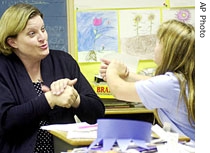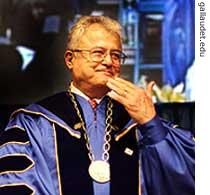VOA慢速英语 2008 0519b
时间:2019-01-11 作者:英语课 分类:VOA慢速英语2008年(五)月
THIS IS AMERICA - Inside the Complex Worlds of Deafness and Deaf Culture in America
Hearing technology offers more hope than ever. Yet the devices are not always welcomed. Also, how one young woman is learning to accept herself for who she is. Transcript 1 of radio broadcast:
18 May 2008
VOICE ONE:
Welcome to THIS IS AMERICA in VOA Special English. I'm Barbara Klein.
VOICE TWO:
And I'm Steve Ember. This week on our program, we explore deaf culture in America.
(MUSIC)
VOICE ONE:

A teacher and her student sign the word ''turtle'' at a West Virginia school
More than three hundred million people live in the United States. By some estimates, about one million of them are deaf and almost ten million are hard of hearing.
A few years ago, Gallaudet University researcher Ross Mitchell wrote a paper about these estimates from findings by the Census 2 Bureau. The estimates suggest that less than one in twenty Americans is deaf or hard of hearing.
But as he pointed 3 out, these findings are limited to people who report difficulty hearing normal conversation. They do not include the larger population of people with hearing loss who have difficulty hearing other sounds.
VOICE TWO:
Some loss of hearing is normal as people age. More than half the people with hearing loss or deafness are sixty-five or older. Less than four percent are under eighteen. But many things can cause hearing loss, including a head injury or noises like gunfire or loud music. In some cases, unless they have a hearing test, people may not recognize the damage until later in life.
Some people have become deaf after taking powerful antibiotics 4 or anti-inflammatory drugs. Cancer drugs can also sometimes damage hearing.
The same is true with infections. Meningitis is the most common cause of hearing loss among children in the United States.
And deafness can be genetic 5. One genetic cause of hearing loss is a nervous system disorder 6 called neurofibromatosis. Growths develop on nerves, especially those in the ear.
VOICE ONE:

Anne Shigley, 20, went deaf from a genetic condition two years ago
Anne Shigley is a college student with neurofibromatosis type two. She began to lose her hearing at the age of six. Doctors found growths on her auditory nerves and on her spinal 7 cord.
They removed some of the growths. But in her senior year of high school, Anne went deaf. That was two years ago. Last year, she received an auditory brainstem implant 8. This device is placed on the nerve center at the base of the brain. Experts say it is the only device that can restore limited hearing to
More about Anne a little later.
(MUSIC)
VOICE TWO:

Cochlear implants 9 may help people with hearing problems
People with hearing loss may wear hearing aids inside their ears to increase the loudness of sounds. People who are deaf may have cochlear implants. These require an operation. A cochlear implant can provide what the experts call a sense of sound. The device changes sounds into electrical signals and sends them to different areas of the cochlear nerve in the ear.
Cochlear implants do not create normal hearing. But experts say they can give deaf people a useful representation 10 of sounds. This can help them in understanding speech. It may take months, though, to be able to make sense of the sounds that they are now able to hear.
VOICE ONE:
Trena Shank is deaf. She teaches American Sign Language at Ohio State University. She says the use of cochlear implants has been much discussed lately in the deaf community. This is partly because doctors are now able to offer them for babies.
Trena Shank says cochlear implants work best in people who have some hearing and in those who lost their hearing later in life. But she is against the use of cochlear implants in very young children or those who are completely deaf. She believes that having an implant can damage feelings of self-worth in children. The children are not accepted in the deaf world, nor are they part of the hearing one either, she says.
VOICE TWO:
Some critics of cochlear implants in babies go so far as to say that supporters are disrespecting deaf culture, or even trying to destroy it. They say they understand that people who became deaf later in life would want technology to help them hear again. But many people who have always been deaf do not consider themselves disabled. They say they are just different and in no need of a cure.
Some people, though, say deaf people should be well informed about the technology available before they make any decisions. This is the position of a group in California called the Let Them Hear Foundation.
VOICE ONE:
Spokeswoman Caitlin Roberson says the group respects whatever decision a deaf person makes, for themselves or family members. She says the goal of the foundation is to bring hearing to those who want it.
Representatives travel internationally to teach doctors and others about cochlear implants and other hearing devices. Some of the companies that support the Let Them Hear Foundation make cochlear implants.
The group is active in efforts in the United States to get insurance companies to pay for the implants. They cost between eighty thousand and more than one hundred thousand dollars each.
(MUSIC)
VOICE TWO:
Deaf culture in the United States has its own language: American Sign Language. A.S.L. is believed to have developed from French Sign Language starting in the early eighteen hundreds.
People communicate, or sign, through movements of the hands, face and body. For example, they show they are asking a question by raising their eyebrows 11 and opening their eyes wide.
A.S.L. has its own rules of grammar, usage 12 and sentence order. There are no signs to put words in the past or future tense. To show that something happened in the past, for example, signers place their hand behind their head. To indicate the future, the hand is placed in front of the body.
In general, the body represents the present. Movement forward represents the future. Movement backward represents the past.
(MUSIC)
VOICE ONE:
Deafness has often been misunderstood, and deaf people discriminated 13 against -- denied jobs or put in schools for children with brain damage. Today, deaf people in the United States are protected by laws that bar discrimination against people with disabilities. But employers can try to persuade courts that some jobs require hearing.
VOICE TWO:
Schoolchildren with hearing impairments usually attend the same classes as other students. They may have sign language assistants. Or the teacher might use a sound-field system. This is a speaker system designed for classrooms. It makes the teacher easier to hear. And in a big classroom, that might help everyone.
VOICE ONE:

May 9, 2007: Robert R. Davila becomes the ninth president of Gallaudet University
New technology and more sign language interpreters mean that deaf students have more educational choices than ever. But there are still schools for the deaf that students can attend if they wish.
Gallaudet University in Washington, D.C., prides itself on being the world's only liberal arts university for the deaf. It was established in eighteen fifty-seven. Today, Gallaudet also has schools for children and teenagers.
VOICE TWO:
The National Technical Institute for the Deaf in New York State is part of the Rochester Institute of Technology. It has one thousand five hundred deaf and hard-of-hearing students.
Anne Shigley is one of them. She began studying at R.I.T. last fall. She says she has improved her signing as well as her lip-reading and listening with her auditory brainstem implant. She tells us that she has made a lot of friends at school. She loves distance running, and wishes there was time to do it even more.
Anne is in the College of Imaging and Art Sciences and wants to study interior 14 design.
VOICE ONE:
She says in an e-mail, I started learning sign language in two thousand six, and really it was hard because I wasn't emotionally ready for that first A.S.L. class. I took A.S.L. two and three at Gallaudet last summer, and then continued learning more here. My parents have tried to learn some sign. Dad says old dogs can't learn new tricks! Mom is a little better at it than Dad, but really slow since she tries to sign every word. So I often say "Please just say it!"
VOICE TWO:
Anne Shigley will celebrate her twenty-first birthday next month. She says hopefully she will get a job this summer, probably at a camp or a store. She says, for some reason it seems harder to find work after I became deaf, but I think I've come a lot farther since last year.
Anne says the Rochester Institute of Technology has helped her to begin to accept herself for who she is. She says she no longer feels like she is trapped in a shell.
We asked her what she would like to say to other young people who find themselves becoming deaf. Her answer is good advice for anyone. "Be strong! Believe in yourself! Live, love and laugh."
(MUSIC)
VOICE ONE:
Our program was written by Nancy Steinbach and produced by Caty Weaver 15. I'm Barbara Klein.
VOICE TWO:
And I'm Steve Ember. Transcripts 16, MP3s and podcasts of our programs can all be found at voaspecialenglish.com. Join us again next week for THIS IS AMERICA in VOA Special English.
- A transcript of the tapes was presented as evidence in court.一份录音带的文字本作为证据被呈交法庭。
- They wouldn't let me have a transcript of the interview.他们拒绝给我一份采访的文字整理稿。
- A census of population is taken every ten years.人口普查每10年进行一次。
- The census is taken one time every four years in our country.我国每四年一次人口普查。
- He gave me a very sharp pointed pencil.他给我一支削得非常尖的铅笔。
- She wished to show Mrs.John Dashwood by this pointed invitation to her brother.她想通过对达茨伍德夫人提出直截了当的邀请向她的哥哥表示出来。
- the discovery of antibiotics in the 20th century 20世纪抗生素的发现
- The doctor gave me a prescription for antibiotics. 医生给我开了抗生素。
- It's very difficult to treat genetic diseases.遗传性疾病治疗起来很困难。
- Each daughter cell can receive a full complement of the genetic information.每个子细胞可以收到遗传信息的一个完全补偿物。
- When returning back,he discovered the room to be in disorder.回家后,他发现屋子里乱七八糟。
- It contained a vast number of letters in great disorder.里面七零八落地装着许多信件。
- After three days in Japan,the spinal column becomes extraordinarily flexible.在日本三天,就已经使脊椎骨变得富有弹性了。
- Your spinal column is made up of 24 movable vertebrae.你的脊柱由24个活动的脊椎骨构成。
- A good teacher should implant high ideals in children.好教师应该把高尚理想灌输给孩子们。
- The operation to implant the artificial heart took two hours.人工心脏植入手术花费了两小时。
- Hormone implants are used as growth boosters. 激素植入物被用作生长辅助剂。 来自《简明英汉词典》
- Perhaps the most far-reaching project is an initiative called Living Implants From Engineering (LIFE). 也许最具深远意义的项目,是刚刚启动的建造活体移植工程 (LIFE)。 来自英汉非文学 - 生命科学 - 医学的第四次革命
- The painting is a representation of a storm at sea.这幅画描绘的是海上的暴风雨。
- All parties won representation in the national assembly.所有政党在国民大会中都赢得了代表资格。
- Eyebrows stop sweat from coming down into the eyes. 眉毛挡住汗水使其不能流进眼睛。
- His eyebrows project noticeably. 他的眉毛特别突出。
- I am clear about the usage of this word at last.这个词的用法我算是弄明白了。
- The usage is now firmly established.这种用法现已得到确认。
- His great size discriminated him from his followers. 他的宽广身材使他不同于他的部下。
- Should be a person that has second liver virus discriminated against? 一个患有乙肝病毒的人是不是就应该被人歧视?
- There is water in the interior of the cave.在山洞的内部有水。
- They went into the interior room.他们进了内室。
- She was a fast weaver and the cloth was very good.她织布织得很快,而且布的质量很好。
- The eager weaver did not notice my confusion.热心的纺织工人没有注意到我的狼狈相。
- Like mRNA, both tRNA and rRNA are transcripts of chromosomal DNA. tRNA及rRNA同mRNA一样,都是染色体DNA的转录产物。 来自辞典例句
- You can't take the transfer students'exam without your transcripts. 没有成绩证明书,你就不能参加转学考试。 来自辞典例句